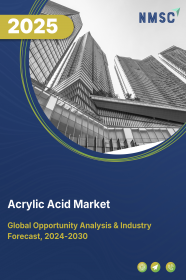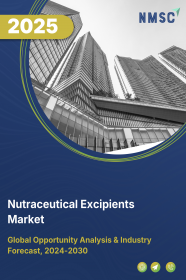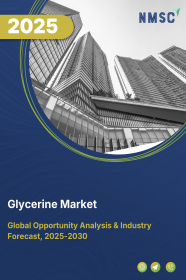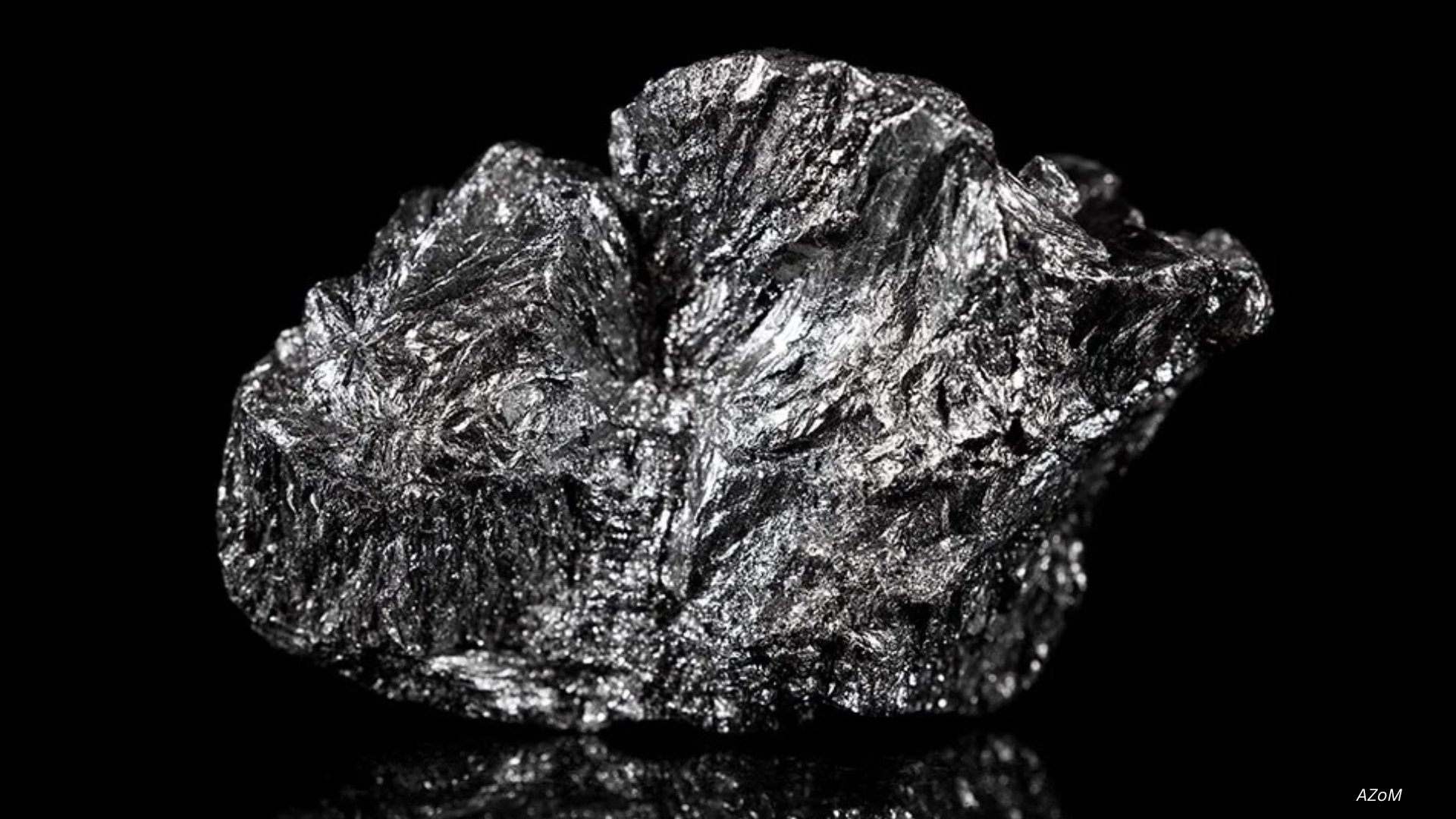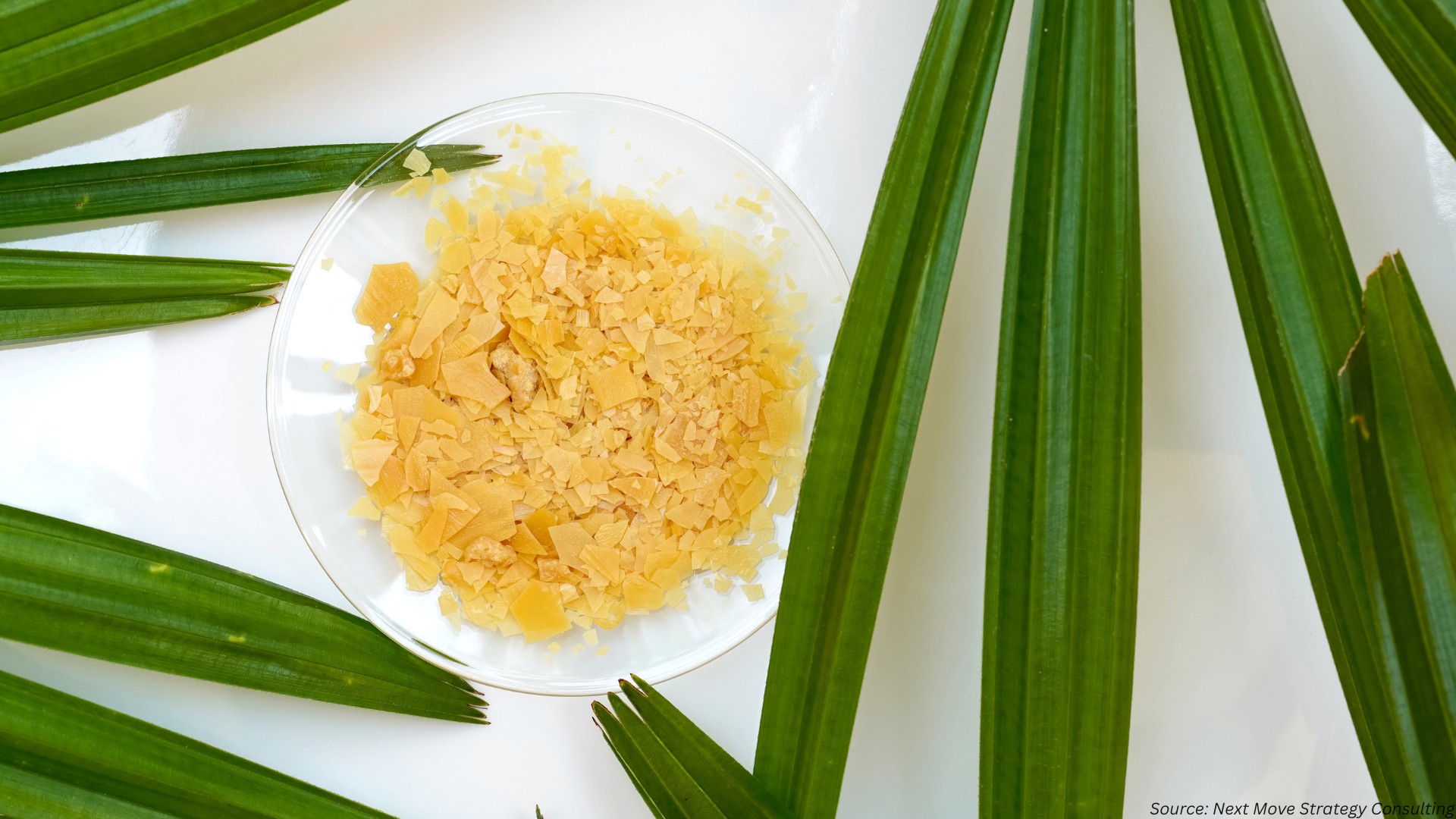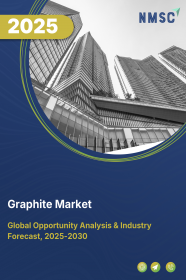
Graphite Market by Type (Natural Graphite (Amorphous Graphite, Flake Graphite, and Vein Graphite) and Synthetic Graphite (Electrodes, Graphite Blocks, Graphite Powder, and Others), by Grade (Fine Grained, Medium Grained, and Coarse Grained), by Application (Refractories, Batteries, Lubricants, Foundries, Recarburising, and Others), and by End-User (Aerospace, Petrochemical, Energy, Food, Transportation, Defense, and Others)– Global Opportunity Analysis and Industry Forecast 2025-2030
Graphite Industry Overview
The global Graphite Market size was valued at USD 9.61 billion in 2024, and is expected to be valued at USD 10.20 billion by the end of 2025. The industry is projected to grow further, hitting USD 13.78 billion by 2030, with a CAGR of 6.2% between 2025 and 2030.
The market is driven by factors such as rise in the global demand for lithium-ion battery, growth in the renewable energy sector and improvements in the production and processing techniques. The market also known as carbon allotrope market is however, facing strict regulations governing of mining and processing activities that hinders the industry growth. Conversely, the increasing emphasis on environmentally friendly practices creates significant opportunities for the market in long run as companies innovate and adopt cleaner production methods.
Surging Demand for EV Batteries Drives Market Growth
The rapid expansion of the electric vehicle (EV) market is a primary driver of the graphite market trends. Graphite, a critical component of lithium-ion battery anodes, is essential for EV production. According to the International Energy Agency, global EV battery demand reached 750 GWh in 2024 and is projected to grow to 2,500 GWh by 2035, driven by increasing EV sales. This surge directly boosts the need for battery-grade graphite. For instance, General Motors secured a multi-billion-dollar agreement with Vianode in 2024 to ensure a stable supply of synthetic graphite, reflecting automakers’ efforts to meet rising demand. This trend aligns with market growth by increasing the demand for high-quality graphite, positioning it as a key material in the clean energy transition.
Enduring Industrial Applications Propel Market Expansion
The sustained demand for graphite in traditional industrial applications continues to support market growth. Graphite’s thermal resistance and conductivity make it essential for refractory materials, such as crucibles in steel production, as well as lubricants and brake linings. Global steel production, projected to grow by 4% annually through 2030, increases demand for graphite electrodes in electric arc furnaces. These applications provide a stable foundation for the market, complementing emerging uses in clean energy and driving consistent market demand across diverse sectors.
Increasing Adoption of Energy Storage Systems Fuels Market Demand
The growing integration of renewable energy sources, such as solar and wind, is boosting demand for graphite in energy storage systems. Graphite’s high energy density makes it vital for large-scale batteries used in grid storage, residential, and commercial applications. As countries pursue renewable energy targets, the need for efficient storage solutions is rising. For example, global renewable energy capacity increased by 10% in 2024, per the International Energy Agency, driving graphite demand for battery storage. This shift aligns with market trends toward clean energy, accelerating market expansion.
Price Volatility and Supply Chain Disruptions Hinder Market Growth
Price volatility and supply chain disruptions pose a significant restraint on the graphite market expansion. The market’s heavy reliance on China, which supplies 78% of global natural graphite and 93% of battery-grade graphite, exposes it to geopolitical risks and export restrictions. For instance, China’s 2024 export permit requirements for certain natural graphite products caused price fluctuations, impacting EV and energy storage industries. Additionally, inconsistent mining outputs and logistical challenges in key regions further destabilize supply, increasing costs for manufacturers. These disruptions limit market stability and hinder growth, as companies struggle to secure reliable, cost-effective graphite supplies for battery and industrial applications.
Advancements in Graphite Recycling Technologies Create Growth Opportunities
Advancements in graphite recycling technologies present significant opportunities for the market. The energy-intensive production of synthetic graphite and environmental impacts of natural graphite mining drive the need for sustainable alternatives. Recycling graphite from used lithium-ion batteries, particularly from electric vehicles (EVs), reduces reliance on virgin materials and mitigates supply chain risks tied to China’s dominance. For instance, Redwood Materials is developing processes to recover battery-grade graphite, securing USD 1 billion in funding in 2024 to scale operations. These innovations lower production costs, align with global sustainability goals, and attract investments, driving market trends toward eco-friendly graphite electrodes solutions and supporting growth in the EV and energy storage sectors.
Market Segmentations and Scope of the Study
The graphite market report is segmented on the basis of type, grade, application, end-user, and region. On the basis of type, the market is divided into natural graphite and synthetic graphite. Natural graphite is again divided into, amorphous graphite, flake graphite, and vein graphite and synthetic graphite is divided into, electrodes, graphite blocks, graphite powder, and others. On the basis of grade the market is divided into, fine grained, medium grained, and coarse grained. Based on application, the market is segmented into refractories, batteries, lubricants, foundries, recarburising, and others. Based on end-user, the market is divided into aerospace, petrochemical, energy, food, transportation, defense, and others. Regional breakdown and analysis of each of the aforesaid segments includes regions comprising of North America, Europe, Asia-Pacific, and Rest of The World (Row).
Geographical Analysis
The Asia-Pacific region dominates the graphite market share, led by China’s control of 78% of global natural graphite production and over 90% of battery-grade graphite processing in 2024, per the International Energy Agency. China’s export restrictions on EV battery graphite materials, introduced in 2024, underscore its influence on global supply chains. Japan’s anti-dumping investigation into Chinese graphite electrodes reflects regional trade tensions. Despite these challenges, the region’s robust EV market, with China reporting 10 million EV sales in 2024, drives significant demand, reinforcing Asia-Pacific’s market leadership and supporting growth.
The North American region is experiencing steady market growth, fueled by initiatives to establish domestic graphite supply chains. The U.S., with minimal natural graphite production since the 1950s, is seeing increased activity through projects like Westwater Resources’ Kellyton Graphite Plant in Alabama, which reported heightened demand in 2024 amid global tariffs. Canada’s Northern Graphite is developing a battery anode material facility in Baie-Comeau, leveraging local resources. Collaborations, such as General Motors’ multi-billion-dollar agreement with Vianode for synthetic graphite in 2024, further bolster regional production. These efforts align with market trends toward self-sufficiency, reducing reliance on imports and driving market expansion.
Europe’s graphite market is growing, driven by the region’s focus on building a sustainable battery industry. However, higher production costs and challenges in establishing complete local supply chains limit competitiveness compared to Asian players. Despite this, companies like Vianode are advancing graphite recycling, launching a recycled graphite product in 2024 to support eco-friendly battery production. These initiatives align with the European Union’s sustainability goals, fostering market trends toward greener graphite solutions and contributing to regional market growth.
The Rest of the World, particularly Africa, presents emerging opportunities for graphite market growth. Countries like Madagascar and Mozambique are significant natural graphite producers, with Africa projected to potentially surpass China as the leading global producer by 2030. However, high-purity spherical graphite and anode production remain limited. Projects like Kazakhstan’s Sarytogan Graphite aim to diversify supply chains. These developments align with market trends toward alternative sourcing, reducing dependence on China and enhancing global market stability.
How Are Key Players Driving Growth and Innovation in the Global Graphite Market Through Strategic Partnerships and Sustainable Practices?
The global graphite industry is fiercely competitive, fueled by electric vehicle (EV) battery demand and sustainability trends. Key players are leveraging supply chain diversification, green technologies, and partnerships to strengthen their market share, despite challenges like China’s 78% natural graphite supply dominance and high production costs.
SGL Carbon secures diverse natural graphite supply chains, mitigating China’s export controls in 2024. Graphite One Inc. advances its Graphite Creek project in Alaska, targeting domestic anode production by 2027. Tokai Carbon Co., Ltd. enhances graphite electrode output for steelmaking, while NextSource Materials Inc. began commercial shipments from its Molo mine in Madagascar in 2024, aiming for 17,000 metric tons annually. Syrah Resources Limited scales its Balama project, despite 2024 production halts due to political unrest. Nippon Carbon Co Ltd. and Imerys S.A. focus on high-purity graphite for batteries, while Triton Minerals Ltd progresses its Ancuabe project with environmental approvals.
Northern Graphite Corp. partnered with Rain Carbon in 2024 for mine-to-battery integration. Talga Group develops graphene-based anode materials, and Asbury Carbons expands specialty graphite offerings. Resonac Holdings Corporation, Gratomic Inc., and Tirupati Graphite PLC innovate in sustainable production, with Vianode’s 2025 recycled graphite reducing emissions by 90% and Graphjet Technology’s 2024 Malaysia facility cutting carbon footprints by 83%.
Key Benefits
-
The report provides quantitative analysis and estimations of the market from 2025 to 2030, which assists in identifying the prevailing market opportunities.
-
The study comprises a deep-dive analysis of market including the current and future trends to depict prevalent investment pockets in the market.
-
Information related to key drivers, restraints, and opportunities and their impact on the market is provided in the report.
-
Competitive analysis of the players, along with their market share is provided in the report.
-
SWOT analysis and Porters Five Forces model is elaborated in the study.
-
Value chain analysis in the market study provides a clear picture of roles of stakeholders.
Graphite Market Key Segments
By Type
-
Natural Graphite
-
Amorphous Graphite
-
Flake Graphite
-
Vein Graphite
-
-
Synthetic Graphite
-
Electrodes
-
Graphite Blocks
-
Graphite Powder
-
Others
-
By Grade
-
Fine Grained
-
Medium Grained
-
Coarse Grained
By Application
-
Refractories
-
Batteries
-
Lubricants
-
Foundries
-
Recarburising
-
Others
By End-User
-
Aerospace
-
Petrochemical
-
Energy
-
Food
-
Transportation
-
Defense
-
Others
By Region
-
North America
-
The U.S.
-
Canada
-
Mexico
-
-
Europe
-
The U.K.
-
Germany
-
France
-
Italy
-
Spain
-
Denmark
-
Netherlands
-
Finland
-
Sweden
-
Norway
-
Russia
-
Rest of Europe
-
-
Asia-Pacific
-
China
-
Japan
-
India
-
South Korea
-
Australia
-
Indonesia
-
Singapore
-
Taiwan
-
Thailand
-
Rest of Asia-Pacific
-
-
Rest of the World (RoW)
-
Latin America
-
Middle East
-
Africa
-
Key Players
-
SGL Carbon
-
Graphite One Inc.
-
Tokai Carbon Co., Ltd.
-
NextSource Materials Inc.
-
Syrah Resources Limited
-
Nippon Carbon Co Ltd.
-
Triton Minerals Ltd
-
Imerys S.A.
-
Northern Graphite Corp.
-
Talga Group
-
Asbury Carbons
-
Resonac Holdings Corporation
-
Global Graphite
-
Gratomic Inc.
-
Tirupati Graphite PLC
REPORT SCOPE AND SEGMENTATION:
|
Parameters |
Details |
|
Market Size in 2024 |
USD 9.61 Billion |
|
Revenue Forecast in 2030 |
USD 13.78 Billion |
|
Growth Rate |
CAGR of 6.2% 2025 to 2030 |
|
Analysis Period |
2024–2030 |
|
Base Year Considered |
2024 |
|
Forecast Period |
2025–2030 |
|
Market Size Estimation |
Billion (USD) |
|
Growth Factors |
|
|
Countries Covered |
28 |
|
Companies Profiled |
15 |
|
Market Share |
Available for 10 companies |
|
Customization Scope |
Free customization (equivalent to up to 80 working hours of analysts) after purchase. Addition or alteration to country, regional, and segment scope. |
|
Pricing and Purchase Options |
Avail customized purchase options to meet your exact research needs. |

















 Speak to Our Analyst
Speak to Our Analyst



